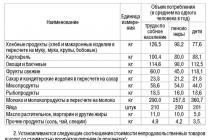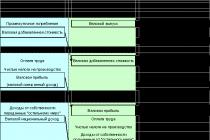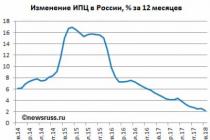Investment management is a kind of set of principles and methods for the implementation of management tasks, which are included in the basis of all investment activity companies.
Due to the basic aspects of management, they usually plan to increase the competitiveness of the enterprise, the economic growth and its development.
These basic aspects include:
- yearning for more high pace development of all areas of the enterprise
- The desire to maximize the expected profit of the company
- , both in specific areas and for the enterprise as a whole
- Ensuring maximum liquidity of investments and the possibility of reinvestment
- Formation of the required amount of financial resources
- Acceleration activities
One of the aspects of the successful development of society and the state as a whole is the competent regulation of capital investments. Most of the processes involved investment area essential for all subjects economic activity. This applies primarily to organizations, enterprises, individuals and legal entities and, of course, to the state.
It is for this reason that investment management requires a serious approach using complex systems and principles for the effective implementation of the entire process. To achieve an excellent effect in management, it is also worth doing a preliminary analysis of the market situation in order to use the available capital wisely and distribute it correctly.
Main stages in investment management
Investment activities in some cases may be ineffective. Because of which? Due to the fact that in almost any medium-sized enterprise, investment processes are carried out only with the help of one structure in the form of several people (in some cases, only one person performs such duties at all).
For effective work all investment processes should create and regulate a kind of system. As a rule, investment management takes place in several basic stages , which play an important role.
- The essence of the first stage is to evaluate the investment process for the past periods.
- The second step is to calculate the amount of funds needed for future investments.
- This stage involves the definition of forms of investment, i.e. in what material form the investment activity will be carried out.
- Here we consider the choice that satisfies the goals and objectives of the company.
- At the fifth stage, an analysis of the effectiveness of investment activities and an assessment of expected risks are carried out.
- The last stage involves taking into account the control and monitoring that takes place during the implementation of the investment project.
An important point is that if at least one of these stages of management activity is skipped or will be implemented with significant mistakes, then all this can have a very negative impact on the process of investment. It is for this reason that when implementing all the previously described stages, you need to plan your actions very seriously and deliberately, in order to achieve the maximum effect.
Summing up, I would like to say that investment management is a difficult process, which is aimed at the implementation of promising forms of investment.
All activities implemented in the course of the management process form a investment portfolio as a set of enterprise programs. Investment management portfolio implies that the company, if necessary, will be able to return to the previous stages of this process.
This is possible when the project demonstrates its low efficiency and it is necessary to check whether the goals were set correctly and the strategies were adjusted.
If these investment management methods have several errors, then an erroneous decision can adversely affect the project as a whole. So it turns out a vicious circle - a continuous and cyclical process of investment management.
Look at the participants in public markets. They never learn their lessons. They are interested in the game.
© Don Valentine
The search for investors is the main task of enterprises engaged in the production of a certain type of product. With a view to the competent implementation of all financial investment the company uses a special authorized body - the investment committee.
What is an investment committee
The Investment Committee is a special body, the functional direction of which is the qualitative development, management, study of declarations, analysis and implementation of the main financial processes of the current economic entity RF.
Such committees, as a rule, have a rather narrow specialization - actions are aimed at searching, as well as a qualitative assessment of all possible objects for profitable investments. This structure also organized complete process implementation of investments and additional supervision of the execution of this process.
The State Committee can be single-level and multi-level - it depends on the detailed number of constituent entities. Also, the number of levels may depend directly on the wishes of investors who are part of the main part of the investment cabinet. The structure of the investment committee is formed on the basis of the current direction of the company's activities and the total number of incoming representatives.
Some committees are structured with many levels and run by a dedicated department that independently proposes pre-approved ideas and workable plans. Additional activities are carried out by a department of the department, which analyzes all directions and puts forward its own approval of the most effective programs in operation.
The formed investment cabinet is the most important part of any successful company and represents a kind of financial fund of any system. The structure of the authorized structure includes only professional specialists who have already dealt with competent investment. They are able to study everything in detail. informational resources on the possible benefits of investments - all this protects companies from possible financial risks. Thanks to the activities of authorized persons, a reliable financial fund depending on the level of income of the company.
Composition of the investment committee
First of all, the committee includes a pre-authorized chairman of the commission, who is appointed only from among the persons who have been operating in the financing system for a long time. Wherein standard term powers this person is at least 1 year. The committee also includes directly authorized representatives of the main members of the committee, who can replace representatives at the main meetings, perform voting and other functions related to investment activities.
The cabinet may include members of the commission involved in the legal direction of activity. They decide legal aspects activities of the investment committee and monitor the quality of performance of duties in accordance with the contractual terms, as well as the timing of the adoption of major decisions.
Additionally, the membership includes members who are engaged in financial and administrative work, including the preparation of basic documentation and the direct involvement of investors. Members of the commission are looking for potential investors and analyze all the provisions put forward for consideration and subsequent approval by the chairman.
Functions and tasks
Each investment cabinet has its own powers and functions:
- detailed analysis and determination of profitable solutions for financial investments;
- analysis and detailed design of the current strategic plan for the qualitative distribution of all proposed investments in the selected territorial district of the Russian Federation;
- discussion and further development of special state regulations that can attract investors of any level;
- creation and high-quality execution of the basic requirements for projects under development, fully financed by the state treasury;
- development and creation of master plans for the construction of innovative investment facilities, as well as infrastructure;
- detailed consideration on the effective improvement of the selected region;
- quality control of the timely implementation of projects with the help of a specially organized commission ( Special attention given to the most significant objects of the selected region);
- detailed collection of financial information on ongoing projects in a particular area;
- work to improve the competitiveness of the selected region;
- drawing up annual reports on the activities of the council, as well as on the results of the development of the competitive environment of an individual subject.
Among the main tasks of the Cabinet, the following areas can be distinguished:
- search for the main sources of financing;
- high-quality development of a general development strategy investment policy a separate company;
- timely control over the implementation of general investment activities.
Thanks to the effective activity of authorized specialists, the standard percentage of implementation of the main plans related to financial investments is significantly increased.
The Committee does not directly distribute all proposed investments - this is the main difference from the existing council. The main part of the committee's activity is the direct approval of projects in the interaction of the legislative and executive authorities.
The Committee ensures and controls the implementation of the main federal programs in a certain region, and also coordinates the activities of all authorized enterprises. Additionally in functional responsibilities may include the creation of new investment objects. Also, the committee can be engaged in the presentation of a certain region or region abroad, significantly increasing the interest of foreign investors.
The Committee organizes various exhibitions and conferences, presents significant projects. It is he who plays a kind of intermediary role between investors and the executive company. Thus, it is a kind of governing body.
The Investment Council, on the contrary, is the executive body and implements all approved projects after receiving investments. The Committee preliminarily legalizes all investments, and the Council fully distributes them in accordance with the needs of the selected territorial region.
How to regulate the work of the investment committee
For the qualitative regulation of all investment departments, a special document has been developed - "Regulations on the Investment Department". It reflects the main structure of the selected unit, the detailed procedure for the general interaction of employees during internal organization, as well as the procedure for their activities with related services.
A separate job description for employees and management, where all the main functional duties are described in stages, as well as the responsibility borne by employees of the entire department.
Separately, a general regulation for managing all investments of an enterprise is being developed, which reflects the main aspects of working with the main financial projects. Also, all formats and templates of documents (special reports and questionnaires) are prepared in advance, as well as detailed instructions for this documentation.
The regulation on the activities of the investment committee operates in accordance with the regulation, which approves the regular procedure for holding and scheduling meetings, and also draws up an individual schedule for each company.
The standard schedule can be approved for a period of up to 12 months and is certified directly by the chairman of the commission. In some cases, extraordinary meetings may be held, about which the chairman notifies all members of the investment cabinet 10 working days before the start of the meeting.
At regular meetings, regulated by the regulation, issues are resolved that are related to the definition of the main guidelines for the future volumes of the company's financing, as well as the choice of priority activities to increase the total number of investors. The committee is also considering new investment projects, their subsequent implementation, as well as amendments made to the general register of investment projects of an existing company. The implementation of the program approved by the project is carefully controlled by authorized persons of the committee. 
The main task of the committee is to fully design and describe the process of creating an ongoing investment project. At the same time, the exact payback periods are necessarily indicated, as well as control over the further flow of financial investments.
The investment cabinet is of particular importance for the competent distribution and implementation of financial investments. It allows not only to smart investment funds and ensure an increase in the efficiency of any enterprise, but also competently organize the work of employees in the formation of investments of the enterprise.
Investments are also a budget, one of many in an enterprise. The peculiarity of this budget is that it must pay off, unlike other budgets that are spent on ensuring the current economic activity of the enterprise. And therefore, specific requirements are imposed on the management of this budget - it is necessary to take into account the long-term and provide payback parameters.
The implementation of investment management together with INTALEV experts allows achieving such effects as:
- Formation of reports on planned and ongoing investment projects for external investors and foreign partners in a short time with high accuracy and with minimal labor costs.
- Control investment program and project analysis.
- Saving resources on projects due to their system control.
- Improve relationships with suppliers and contractors through timely and accurate payments through a project-based payment calendar.
- Achievement of indicators of payback and efficiency of projects due to accurate business planning, ongoing analysis and control of investment implementation.
- Increasing the overall profitability of project implementation.
Full control over capital expenditures (CAPEX) and return on investment (ROI)
See how INTALEV experts solve important investment management tasks. The flagship product "INTALEV: Corporate Management" is used for automation.
- financial modeling
- Monitoring the implementation of contracts
- Integration with project activities









financial modeling
Big projects almost never fit into "deadlines" and budgets. According to Professor Bent Flewberg, who studies megaprojects, on average, the initial budget is exceeded by 30%. Flyberg came up with a formula for why this happens. For a project to be approved, four main components are needed:
- underestimation of costs
- reassessment of income
- underestimation of the environmental impact,
- reassessment of the future effect.
To prevent this from happening, INTALEV: Corporate Management offers flexible options for modeling future projects and factor analysis.
The main assessment methods are automated
The main method for evaluating investment projects in the extractive industry today remains the DCF (Discounted Cash Flow) method, which uses NPV (Net Present Value) as a measure of the value of an investment proposal. Along with NPV, the software product "INTALEV: Corporate Management" also calculates internal norm profitability (IRR - Internal Rate of Return), payback period (PP - Payback Period) of the project, income from the project and other indicators. All these parameters are used to evaluate investment attractiveness projects.
It is important that the accepted plans automatically fall into single system management accounting and budgeting and managers immediately receive consolidated budgets. In the case of adjustments to estimates or resource plans, these changes should be immediately reflected in the budgets.
It often happens that a company can choose different technical solutions for acquiring capital funds. In this case, you need to compare capital expenditures, borrowing costs for their acquisition and subsequent operating expenses and choose the best option. "INTALEV: Corporate Management" allows you to set up templates for automated decision-making.
For all participants in the investment management process, key indicators individual projects and portfolio of projects.






Monitoring the implementation of contracts
Once the budget and the Annual Comprehensive Procurement Program (ACP) have been adopted, it is important for project managers and implementers to complete and track the ongoing tasks that form the project plan. To implement the project, the organization opens tenders and concludes contracts. Here it is important to clearly follow all the procedures, namely, to have the relevant documents on hand in a timely manner.
Monitoring the implementation of contracts: financial terms, terms and obligations of the parties
To control and assist in the performance of such tasks, INTALEV: Corporate Management has developed a powerful mechanism of business processes. It allows you to describe all the essential parameters of a project or contract (terms, amounts, milestones and key indicators) and automatically set tasks for employees: complete, check, analyze. In case of deviations, information can be escalated along the vertical of project management.
If necessary, this circuit includes a claim and claim work. It can include both incoming claims (from customers and external counterparties) and outgoing claims (to suppliers and other counterparties).
As a result, the company receives:
- clear deadlines for electronic approval of contracts;
- improving the discipline of the initiators during the negotiation of the contract: insurance against the loss of the contract, constant informing about the status of the contract, etc.;
- clear monitoring of the entire state of affairs under the contract: mutual settlements, acts, internal documentation;
- increasing the responsibility of the initiators of contracts for the final result.






Monitoring the implementation of investment plans
After investment decision adopted, it is necessary to establish regular monitoring of its implementation. Need to keep track of spending Money, income streams and value generation. To understand whether the development of the project is going according to plan or it is necessary to agree on deviations.
Investment monitoring data is automatically retrieved from primary accounting
The difficulty is to isolate investment flows in common system accounting. Based on the developed methodology, analytical features are indicated for each operation. It is important that in this case there is a single data entry and the complexity of operations practically does not increase. With the help of "INTALEV: Corporate Management" it is possible to establish the necessary analytics in management accounting, excluding, if possible, additional work for accountants and economists. Thanks to flexible data translation mechanisms, it is possible to “pull” any data from the primary circuit or other systems for management tasks. And if there are not enough of them in the operational circuit, then you can set up the introduction of any data directly into INTALEV: Corporate Management.
Key investment control indicators are calculated automatically
For all participants in the investment management process, key indicators are developed for individual projects and a portfolio of projects: earned value, deviation, planned and current profitability, and any other indicators for making management decisions.

The specialization of the MBA program of the HSE Banking Institute "Investment Management" is designed for professionals who want to become leaders in financial management both for the company and for personal purposes. The content of the specialization takes into account the most relevant innovations financial market, which was confirmed by the conclusion in 2009 (the first partnership in Eastern Europe).
WHAT THE SPECIALIZATION OFFERS
- The content of the specialization is based on the CFA Candidate Body of Knowledge, prepared taking into account the annual survey of the world's top employers
— Lecturers-practitioners with certificates with experience in leadership positions in Russian and foreign companies
— Using the Harvard Business School methodology based on group work with real business cases
- Access to the Thomson Reuters Eikon terminal and
- Discounts up to 75% on any of the three levels of the CFA exam
– Training in the city center (m. Pushkinskaya / Tverskaya)
WHAT YOU WILL LEARN
— Form optimal strategies for managing the company's finances
— Develop and analyze investment projects
— Manage the risks of the company, project
- Lead a team and create competitive advantages
— Make management decisions using data analysis
- Class mode Classes 3 times a week: 2 times a week on weekdays from 18.30 to 21.40, Saturday from 10.00 to 17.20
- Issued document Diploma of professional retraining
- Language of instruction Russian
- Implementing unit
- Direction of training ,
- Venue Moscow, Maly Gnezdnikovsky pereulok, 4, office 401 (passage to metro station Pushkinskaya, Tverskaya)
Admission
Target group
Financial analysts, investment project managers, company executives real sector and financial institutions associated with the implementation and development of projects.
Documents for admission
Original and copy of passport or equivalent document
Original and copy of the document on education and qualifications or certificate of study for persons receiving higher education
Original and copy of the document on the change of surname, name, patronymic (if necessary)
1 photo size 3x4
Certified copy at work work book(work experience must be at least 2 years)
To enroll in the MBA program, you must pass an entrance test.
Admission conditions
teachers
Graduates
“In the current economic situation, there is a particularly acute need to understand many business processes banking, which is why I came to the program of additional business education.
Why did I choose HSE?
- Qualitatively selected disciplines that are relevant at the moment;
- Highly qualified staff of teachers;
- Advice from many colleagues who studied at various programs at the HSE;
- Convenient schedule for attending classes (2 working days + 1 day off).
The program provides students with the opportunity to understand many issues from a practical point of view, to understand how everything happens in large organizations. But you must already have a basic understanding of many aspects of banking and investment, otherwise it will be difficult to participate in discussions and cases.
For those who want to study the discipline in more depth, it is necessary to read all the literature recommended by teachers.
I also consider it a huge plus to get acquainted with colleagues from other organizations (they are mostly bank employees). This helps to resolve issues in the current work activity.
The result - the program fully met my expectations, in the future I want to continue my studies, but already under the DBA program.
Akhmadeev Artur Robertovich
Leading Specialist of the Department for Management of the Structure of Assets and Liabilities of OJSC "Bank Uralsib"
Immediately I would like to note interesting courses of disciplines that provide not only skills and knowledge, but also help to form a critical approach to various business models, look for new meanings, evaluate “not like everyone else”.
Your way of thinking changes quickly enough - you begin to see the world economic system, to understand the processes taking place in it, a clear understanding of the strategy and tactics of the company's development is formed. And as a result, you learn to manage these processes, risks, people and the company as a whole. Of course, all this becomes possible thanks to the "star" staff of teachers, many of whom are widely known in the financial community.
As for special literature, a qualitative selection of modern publications is given, taking into account the experience of Western business schools in relation to Russian practice. In general, the learning process is based on the model of Western business education programs. Much attention is paid to cases, tasks, a detailed analysis of existing and implemented projects, the development of managerial skills, which makes training on the program highly effective and allows you to systematize previous knowledge and experience, rethink management processes.
The program has changed a lot for me. The main conclusion that I came to at the end of the program was the realization of my potential and reserve for growth.
In conclusion, I would like to thank Vasily Mikhailovich Solodkov and the employees of the Banking Institute for meetings and the opportunity to communicate with people from the business sector, who broaden their horizons, help to look at ongoing events from different points of view, sometimes the most unexpected.
Abovyan Karine Ashotovna
Key Account Manager, CJSC "Bank Intesa"
“In 2012 I graduated from the MBA program at the Banking Institute of the National Research University Higher School of Economics with a degree in Investment Management. Choice educational institution carried out on the basis of reviews on the Internet, recommendations of acquaintances and colleagues who have been trained in MBA programs earlier. Teachers of the program from the very beginning of the training do not just give lectures, but make them think, ask questions, give the opportunity to independently test the acquired knowledge in practice. The vast majority of teachers are practitioners, which does not negate their theoretical training at high level. Lectures are interesting, lively, in the mode of dialogue with the audience; by the way, you feel great respect for the listeners.
I recommend future students not to miss a single pair of Doctor of Economics, Academician of the Russian Academy of Sciences Entov R.M. ("Money and economic decisions”), Tregubova V.A. ("Mergers and Acquisitions"), Popova D.V. ("Corporate financial management”), Kharakoz Yu.K. ("Financial Accounting"), Solodkova V.M. (“International currency markets”), Moshkova M.E. (“Company Valuation”).
During the training, I gained knowledge covering the history from the emergence of money to modern instruments of the monetary policy of countries, monetary regulation, ongoing macroeconomic processes, the value of currencies in relation to each other, the dependence of the processes taking place in the country on the volume of export-import operations, which determines the value of the company, what is cash flows and how to calculate them, proper financial accounting.
Each teacher is graded by students on several indicators, before the start of classes, teachers give an extensive list of recommended literature, links to specialized sites, which makes it possible, if desired, to prepare well for exams and become a true professional in investment management in the future.
Wi-Fi is available in the classrooms, which allows you to access sites with the most up-to-date information on site. I want to say special thanks to the curator of our group - Natalya Alekseevna Frantseva. All the necessary information was provided on time, additional analytical information promised during the lectures was conveyed by the teachers in full, the wishes of the listeners regarding the topics of the lectures were fully taken into account, it was always possible to get the contact information of the teachers.
In principle, I really liked my studies, I expanded my horizons, began to understand what was happening financial processes, unfortunately, I do not work in the field of investments yet, however, I plan to deal with them in the future. For those wishing to acquire a thorough knowledge of investment management, I recommend the Banking Institute of the Higher School of Economics!"
Shestakov Andrey Alekseevich
General Director of TorgInvest LLC
Partners
 The main foreign partner of the Banking Institute is the CFA Institute (USA) - international organization, awarding one of the most authoritative titles in the field of finance and investment - Chartered Financial Analyst. In 2009, the Higher School of Economics became the first university in Eastern Europe to receive partner status of the CFA Institute, which recognized the MBA Investment Management program of the Banking Institute as a partner program. In 2012, the Master's program "Financial Analyst", implemented at the Banking Institute, received the status of a partner program of the CFA Institute. This is a unique case for the programs of our educational field and a very significant achievement, since affiliate program The CFA Institute can only recognize a program whose curriculum is more than 75% consistent with the "syllabus" of the CFA Institute program. This is evidence that the structure and content of the courses of the MBA program "Investment Management" and the master's program " Financial analyst» meet the highest global standards in financial education.
The main foreign partner of the Banking Institute is the CFA Institute (USA) - international organization, awarding one of the most authoritative titles in the field of finance and investment - Chartered Financial Analyst. In 2009, the Higher School of Economics became the first university in Eastern Europe to receive partner status of the CFA Institute, which recognized the MBA Investment Management program of the Banking Institute as a partner program. In 2012, the Master's program "Financial Analyst", implemented at the Banking Institute, received the status of a partner program of the CFA Institute. This is a unique case for the programs of our educational field and a very significant achievement, since affiliate program The CFA Institute can only recognize a program whose curriculum is more than 75% consistent with the "syllabus" of the CFA Institute program. This is evidence that the structure and content of the courses of the MBA program "Investment Management" and the master's program " Financial analyst» meet the highest global standards in financial education.
One of the main benefits of partnership is providing students enrolled in partner programs with the CFA Institute with a 70% discount on the registration fee for the C exam FA (all three levels).
Also, on an annual basis, the HSE student team takes part in competitions in financial analysis CFA Institute Research Challenge - "investment Olympiad" for students of financial and economic faculties around the world. The competition is attended by the world's leading universities that implement bachelor's and master's programs in finance and business.
The purpose of the competition: to prepare a study that will analyze the activities of the selected company and evaluate its value. The team that wins the Russian tour gets the opportunity to compete in the European Regional Championship and, ultimately, in the finals of the CFA Institute Research Challenge championship.
 The CFA Association (Russia) was registered in accordance with the rules of the CFA Institute on October 22, 2004. Since then, the CFA Association (Russia) has come a long way and rightfully occupies one of the leading positions among professional associations in Russia. During this time, the number of members of the CFA Association (Russia) has grown from 24 to 503 people, 96.8% of which are CFA certificate holders. The CFA Association (Russia) has been repeatedly recognized by the CFA Institute as the most active national association in the world (with up to 1000 members).
The CFA Association (Russia) was registered in accordance with the rules of the CFA Institute on October 22, 2004. Since then, the CFA Association (Russia) has come a long way and rightfully occupies one of the leading positions among professional associations in Russia. During this time, the number of members of the CFA Association (Russia) has grown from 24 to 503 people, 96.8% of which are CFA certificate holders. The CFA Association (Russia) has been repeatedly recognized by the CFA Institute as the most active national association in the world (with up to 1000 members).
The HSE Banking Institute is an official partner of the CFA Association (Russia). The status of a partner of the CFA Association (Russia) provides us with ample opportunities to involve our students in the activities of the association and opens up a unique opportunity to prove ourselves and get to know financial market professionals.
In addition, members of the CFA Association (Russia) actively participate in educational process at the Banking Institute - more than 20 CFA charterholders are guest lecturers of our programs.
 Cooperation with the University of Applied Sciences Inholland (Inholland University of Applied Sciences) began in 1995, when this higher school was called the Amsterdam Academy of Finance and Banking. It is now the largest university in the Netherlands with over 40,000 students. The first joint project is the course "Banking Management", developed with the support of the NFPK and the World Bank. More than 1,000 employees of the Bank of Russia, Vnesheconombank, Sberbank of the Russian Federation and commercial banks were trained under this program. The experience gained in preparing and conducting a course in banking management made it possible to create at the Banking Institute a second higher education program in the specialty "Finance and Credit" (specialization "Banking") and an MBA program "Finance and Banking", which were opened at the Banking Institute in October 2002. At the moment, Inholland University and the Banking Institute continue to actively cooperate in the field of joint research projects and teacher exchanges.
Cooperation with the University of Applied Sciences Inholland (Inholland University of Applied Sciences) began in 1995, when this higher school was called the Amsterdam Academy of Finance and Banking. It is now the largest university in the Netherlands with over 40,000 students. The first joint project is the course "Banking Management", developed with the support of the NFPK and the World Bank. More than 1,000 employees of the Bank of Russia, Vnesheconombank, Sberbank of the Russian Federation and commercial banks were trained under this program. The experience gained in preparing and conducting a course in banking management made it possible to create at the Banking Institute a second higher education program in the specialty "Finance and Credit" (specialization "Banking") and an MBA program "Finance and Banking", which were opened at the Banking Institute in October 2002. At the moment, Inholland University and the Banking Institute continue to actively cooperate in the field of joint research projects and teacher exchanges. Every year, HSE students take part in the Sustainability in Banking and Finance international student program. This international project is implemented by Inholland University of Applied Sciences, the Netherlands with the participation of student teams from universities:
CEU San Pablo University Madrid (Spain)
- Centria University of Applied Sciences (Finland)
- University College Gent (Belgium)
- Higher School of Economics (RF)
 The University of Applied Sciences BFI Vienna is a partner of the Banking Institute in exchange programs for students of master's programs. Based on the student exchange agreement, the Banking Institute can send up to two students per academic year to the University of Applied Sciences Vienna, who can be enrolled in any study course, provided that the student has the relevant skills.
The University of Applied Sciences BFI Vienna is a partner of the Banking Institute in exchange programs for students of master's programs. Based on the student exchange agreement, the Banking Institute can send up to two students per academic year to the University of Applied Sciences Vienna, who can be enrolled in any study course, provided that the student has the relevant skills.
On an annual basis, the Vienna University of Applied Sciences organizes an International Master Course Week on the topic "Educating for Global Competence", in which students of the Master's program "Financial Analyst" are invited to participate. As part of a week-long study at the Vienna University of Applied Sciences, students can choose one of the specializations:
Managing International Projects;
Emerging Markets and Crises.
Universities participating in the program:
University of National and World Economy (Bulgaria)
- Université Catholique de Lyon/ESDES School of Management (France)
- European University of Applied Sciences Brühl (EUFH Brühl) (Germany)
- University of Economics Katowice (Poland)
- National Research University Higher School of Economics (RF)
- Southern Federal University Rostov-on-Don (Russian Federation)
- Kyiv National Economic University (Ukraine)
 The University of Economics in Wroclaw (Uniwersytet Ekonomiczny we Wrocławiu) was founded in 1947 and has the status state university. He is the most popular among students. economic university in Poland. For more than 65 years, future specialists have been successfully trained here various areas economy and public administration. The university has 15,000 students. The quality of education of the educational institution is evidenced by the fact that it is the only economic university and one of eight universities in Poland, in which all faculties received the I scientific category according to the Ministry of Science and Education of Poland.
The University of Economics in Wroclaw (Uniwersytet Ekonomiczny we Wrocławiu) was founded in 1947 and has the status state university. He is the most popular among students. economic university in Poland. For more than 65 years, future specialists have been successfully trained here various areas economy and public administration. The university has 15,000 students. The quality of education of the educational institution is evidenced by the fact that it is the only economic university and one of eight universities in Poland, in which all faculties received the I scientific category according to the Ministry of Science and Education of Poland.
Partnership of the Banking Institute and Economic University in Wroclaw is aimed at strengthening the academic and cultural interaction of students. The partnership provides for the exchange of students during one academic year for a period of 1 semester from among those studying undergraduate and graduate programs in economics, finance and management.














